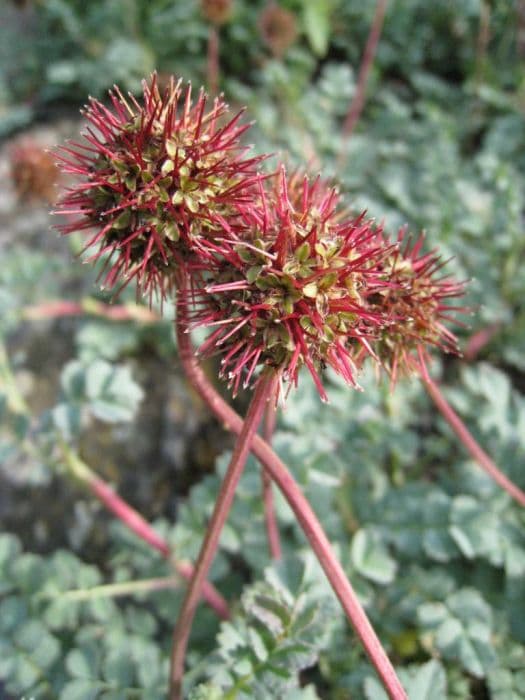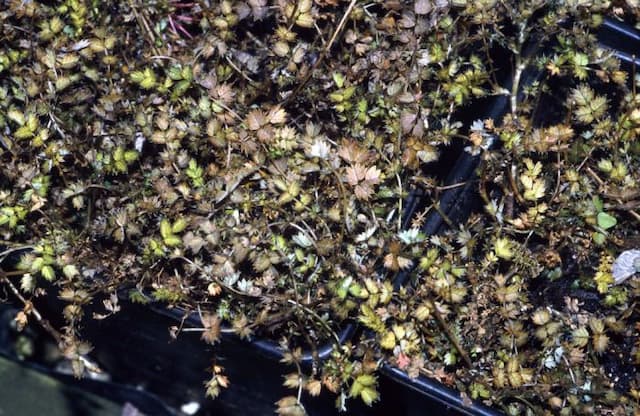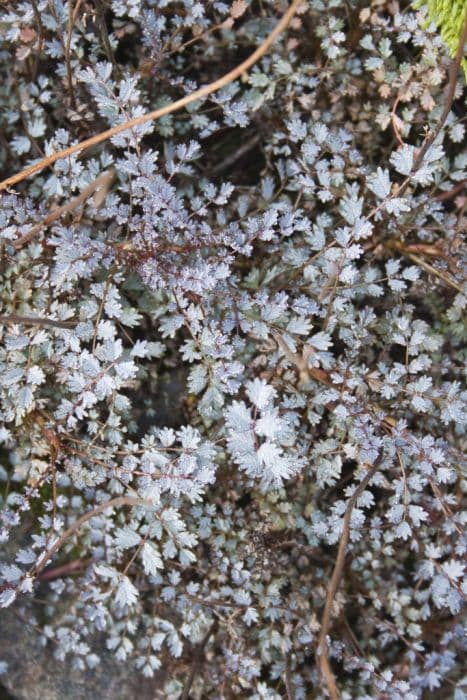Hybrid Tea Rose Rosa Velvet Fragrance = 'Fryperdee' (HT)
![rose [Velvet Fragrance]](/_next/image?url=https%3A%2F%2Fplants-admin.emdemapps.com%2Fimages%2Fplants%2F%2Fimages%2F604b54392cf67.png&w=3840&q=75)
ABOUT
The Rosa Velvet Fragrance, often referred to as a hybrid tea rose, is a beautiful shrub known for its captivating flowers and lovely scent. The blooms are a velvety, deep crimson color, exhibiting a classic rose shape with elegantly layered petals that gently unfurl as the flower opens. Each flower is full and rounded, with a high center that adds to its sophisticated profile. The petals have a soft, velvety texture that is delightful to touch, and their edges may exhibit a slight curl, giving the blossoms a luxurious appearance. As its name suggests, the Velvet Fragrance rose emits a strong and delightful fragrance that is rich and heady, reminiscent of traditional rose scents that many find alluring and soothing. The plant's foliage complements the flowers, with rich green leaves that have a glossy finish, adding to the plant’s overall vitality and visual appeal. The leaves are usually oval-shaped with a slightly serrated edge, and they provide a lush background that makes the crimson flowers stand out even more prominently. The overall appearance of the Velvet Fragrance rose is one of classic elegance, combining the iconic beauty of hybrid tea roses with a color and scent that make it a highly desirable addition to any garden that aims to showcase traditional charm with a sensory appeal.
About this plant
 Names
NamesFamily
Rosaceae.
Synonyms
Velvet Fragrance Rose, Hybrid Tea Rose.
Common names
Rosa Velvet Fragrance = 'Fryperdee' (HT).
 Toxicity
ToxicityTo humans
The most common name for Rosa Velvet Fragrance = 'Fryperdee' (HT) is hybrid tea rose. Hybrid tea roses are not considered toxic to humans. However, they do have thorns that can cause physical injury if handled improperly. In terms of ingestion, eating the flowers, hips, or leaves in small quantities is typically not harmful, but they are not meant for consumption and doing so could potentially cause stomach upset or an allergic reaction in sensitive individuals. They are mainly grown for ornamental purposes and not for human consumption.
To pets
The most common name for Rosa Velvet Fragrance = 'Fryperdee' (HT) is hybrid tea rose. Hybrid tea roses are not considered toxic to pets such as dogs and cats. Similar to humans, the main concern for pets is the physical danger posed by the thorns, which can cause injuries if a pet tries to chew or swallow the plant. The rose hips, leaves, and petals might cause mild gastrointestinal upset if ingested in large quantities, but they are generally not harmful to pets. As with any non-food plant, it's best to prevent pets from ingesting large amounts to avoid any potential stomach upset.
 Characteristics
CharacteristicsLife cycle
Perennials
Foliage type
Deciduous
Color of leaves
Green
Flower color
Red
Height
3-4 feet (0.9-1.2 meters)
Spread
3-4 feet (0.9-1.2 meters)
Plant type
Shrub
Hardiness zones
6
Native area
Cultivar
Benefits
 General Benefits
General Benefits- Attractive Blooms: The Rosa 'Fryperdee' is known for its sumptuous, velvety crimson flowers, which can add a touch of elegance to any garden.
- Fragrance: This variety is appreciated for its strong, old-fashioned rose fragrance, making it a delightful sensory addition to any outdoor space.
- Long Blooming Period: It typically offers a prolonged blooming season, providing color and interest in the garden for an extended time.
- Landscape Versatility: It can be used in various landscaping designs, including mixed borders, rose gardens, and as a standalone specimen.
- Pollinator Attraction: The flowers attract pollinators like bees and butterflies, contributing to the health of the garden ecosystem.
- Cut Flower Use: The roses are excellent for cutting and can be used to create beautiful indoor floral arrangements.
- Cold Tolerant: This hybrid tea rose variety often has good resistance to cold, making it suitable for growing in regions with cooler climates.
- Disease Resistance: It may exhibit resistance to common rose diseases, reducing the need for frequent chemical treatments.
 Medical Properties
Medical PropertiesThis plant is not used for medical purposes.
 Air-purifying Qualities
Air-purifying QualitiesThis plant is not specifically known for air purifying qualities.
 Other Uses
Other Uses- Hybrid Tea roses like 'Fryperdee' can be used to make natural dyes for fabric or paper, giving a subtle range of colors from soft pinks to earthy tones depending on the mordant used.
- The petals of the rose can be pressed or laminated to create decorative bookmarks which retain the beauty of the flower and offer a fragrant reminder of the outdoors when used in reading materials.
- Rose petals can be incorporated into homemade potpourri mixes, combining the velvet fragrance with other dried flowers and spices to scent a room naturally.
- Dry or fresh rose petals can be added to bath water for a luxurious and aromatic bathing experience, which can be both relaxing and mildly skin-softening.
- The strong fragrance of the 'Fryperdee' roses can be captured by infusing the petals in oils to create natural perfumes or scented candles, offering a gentle and non-synthetic scent option.
- Used as a natural confetti, the petals of these roses are biodegradable and can add a fragrant and colorful touch to celebrations without harming the environment.
- Rose petals can be frozen in ice cubes to create an elegant and eye-catching addition to drinks for special occasions or summer refreshments.
- The petals can be used in crafting to make floral resin jewelry or decorations, encapsulating the beauty of the rose in a durable form.
- Hybrid Tea rose petals can be used to decorate cakes or desserts, as they are edible and can provide an elegant touch to culinary presentations when used sparingly.
- As a natural source of color, rose petals can be used to tint homemade lip balms, providing a light pink hue and a subtle floral flavor.
Interesting Facts
 Feng Shui
Feng ShuiThe Hybrid Tea Rose is not used in Feng Shui practice.
 Zodiac Sign Compitability
Zodiac Sign CompitabilityThe Hybrid Tea Rose is not used in astrology practice.
 Plant Symbolism
Plant Symbolism- Love: As a member of the rose family, Rosa 'Fryperdee' is most commonly associated with love, especially a deep, passionate and romantic kind.
- Beauty: The velvety petals and rich fragrance of this rose symbolize beauty and grace.
- Mystery: The deep, velvety roses often carry a sense of mystery due to their lush and intense appearance.
- Luxury: The ‘Velvet Fragrance’ rose suggests luxury and opulence, perhaps due to its sumptuous texture and alluring scent.
- Devotion: Roses are often given as a symbol of devotion, representing the giver's commitment and loyalty.
 Water
WaterThe Hybrid Tea Rose, commonly known as the Rosa Velvet Fragrance, requires deep watering about once a week during active growing seasons, spring and summer. It is essential to provide approximately 1 to 1.5 gallons of water per plant during each watering session, ensuring that the water reaches deep into the soil to foster a strong root system. During periods of extreme heat or drought, increase the frequency to every four to five days. In the fall, reduce watering to help the plant harden off for winter. Ensure the soil is well-draining to prevent root rot, and water early in the day to allow foliage to dry and reduce the chance of disease.
 Light
LightThe Rosa Velvet Fragrance thrives in full sunlight conditions, requiring at least six to eight hours of direct, unfiltered sun each day. Choose a spot in your garden that receives ample morning light, as this will help dry the dew on the leaves, reducing the risk of fungal diseases. Avoid planting it in full shade or overly dim areas, as this can stunt growth and reduce flowering.
 Temperature
TemperatureFor optimal growth, the Hybrid Tea Rose prefers a temperature range between 65°F and 75°F during the day. Nighttime temperatures should not fall below 55°F for the wellbeing of the plant. While Rosa Velvet Fragrance can typically endure temperatures as low as 20°F once established, it is best to protect the plant with mulch or coverings if extreme cold is expected.
 Pruning
PruningPruning the Hybrid Tea Rose is crucial for promoting strong growth, improving airflow, and encouraging vibrant blooms. Prune in late winter or early spring when new growth begins, removing dead or diseased wood and thinning out the center of the plant to create an open vase shape. Cut back the remaining canes by about one-third to one-half, making the cuts at a 45-degree angle just above outward-facing buds.
 Cleaning
CleaningAs needed
 Soil
SoilHybrid Tea Rose prefers well-drained, loamy soil enriched with organic matter. The ideal pH range for this rose is between 6.0 and 6.5. A good soil mix would consist of equal parts garden soil, compost, and coarse sand or perlite to ensure proper drainage.
 Repotting
RepottingHybrid Tea Roses planted in containers may require repotting every 2 to 3 years. It's best to repot in early spring before the growing season starts, but only if the plant has outgrown its pot or the soil is depleted.
 Humidity & Misting
Humidity & MistingHybrid Tea Roses do well in average garden humidity conditions. They do not have specific humidity requirements, but protecting them from excessive moisture can help prevent fungal diseases.
 Suitable locations
Suitable locationsIndoor
Ensure bright indirect light, regular watering, and air circulation.
Outdoor
Plant in full sun, well-draining soil, and provide regular water.
Hardiness zone
5-9 USDA.
 Life cycle
Life cycleThe Rosa 'Velvet Fragrance', commonly known as hybrid tea rose, begins its life cycle when a seed germinates, typically requiring a period of stratification to break dormancy. Upon sprouting, the seedling establishes roots and shoots, slowly developing into a young rose bush. With proper care, including adequate sunlight, water, and pruning, the bush matures and starts to develop flower buds by channeling energy into its reproductive structures. These buds bloom into the characteristic large, fragrant flowers of the hybrid tea rose range, usually during the warmer months. After pollination, potentially involving insects or human intervention for cultivated varieties, the flowers will develop into fruit known as hips, containing seeds for the next generation. The plant then enters a period of dormancy during the colder months, conserving energy to restart the cycle come spring.
 Propogation
PropogationPropogation time
Spring to Summer
Propogation: The Rosa Velvet Fragrance or its cultivar name 'Fryperdee' is best propagated through the method of stem cuttings. This technique is typically performed in late spring or early summer when the plant's growth is most vigorous. To propagate by stem cuttings, a grower would select a healthy, non-flowering stem from the current year's growth and cut a length of about 6 inches (15 centimeters), making sure it includes at least two or three sets of leaves. The bottom leaves are stripped, and the cut end is often dipped in rooting hormone before being placed into a moist, well-draining potting mix. The cutting is then kept under high humidity, out of direct sunlight, and at a consistent temperature until roots develop, which may take several weeks. Once rooted, the new plant can be gradually acclimatized to less humidity before being transplanted into the garden.









